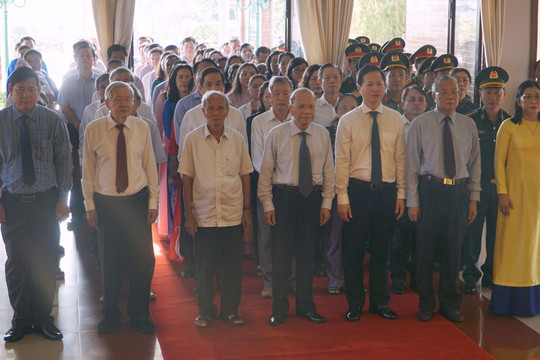 |
| The Kien Giang River starts to overflow, causing widespread flooding in Le Thuy district, Quang Binh province. (Photo: NDO/Huong Giang) |
In a telegraph signed by Deputy PM cum Head of the Central Steering Committee for Natural Disaster Response, Trinh Dinh Dung, on behalf of the PM, the government leader asked central localities to focus on coping with the heavy rains and flooding that left five people dead and six others missing as of this morning (Oct 8).
According to the document, from October 6, the central region suffered heavy rains with the total rainfall ranging from 300 to 500mm, even up to 700 to 900mm in some places in Quang Tri and Thua Thien Hue, causing flooding that damaged traffic routes.
It is forecasted that heavy rain will continue in the coming days, with flooding on local rivers from Quang Binh to Quang Ngai, posing a high risk of flash floods, landslides and serious inundation on a large scale in low-lying areas.
In order to proactively cope with the natural disasters, ensure the safety of locals and limit the damage to people's properties, the PM assigned specific tasks to the relevant agencies, ministries and localities.
Local authorities in provinces and cities from Ha Tinh to Phu Yen, as well as in the Central Highlands, especially in the provinces of Quang Tri, Thua Thien Hue, Quang Nam, Quang Ngai and Quang Binh, were asked to closely monitor the progress of rain and floods and immediately implement measures to cope with the current situation.
Attention should be paid to reviewing and proactively mobilising forces to relocate households in dangerous areas that are prone to flooding and isolation to ensure the safety of local people.
Local authorities were urged to send missions to visit, encourage and support the families of victims during the disasters, while actively providing food and temporary accommodation for displaced households.
They should inform locals in time and guide them during the heavy rain and floods, while arranging forces to control and guide traffic flow when flooding and heavy rains occur, as well regulating the attendance of students at schools to ensure their safety depending on the situation in each locality, in addition to guiding local people to stockpile food and necessities in case of a prolonged separation.
Measures should be implemented to reinforce and protect dykes, dams and reservoirs, with plans available to actively evacuate neighbourhoods downstream. Local authorities should direct and guide farmers on taking measures to protect crops and proactively harvest rice, crops, and aquatic products to limit the damage.
Other ministries and agencies were asked to coordinate with localities in actively directing and implementing measures in response to heavy rain and flooding, while maintaining the forces and means to be ready to cope with any situation.
The Ministry of Health was asked to direct and guide localities in implementing epidemic prevention and control, especially COVID-19, in evacuation areas and proactively support localities affected by rain and floods with chemicals necessary to ensure medical examination and treatment, environmental sanitation, and the prevention of epidemics after the floods subside.
The media was asked to regularly update their information on rain and flood developments so that local people can develop their own active response plans.
Source: NDO




















.jpg)





.jpeg)

.jpeg)


.jpeg)


